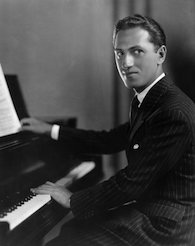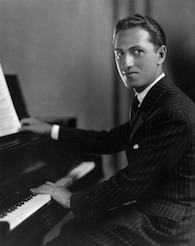
One of the most popular American composers of all time, George Gershwin, has his birthday today. Born in 1898 to Russian-Jewish immigrant parents, he and his brother Ira became one of the top songwriting teams for Broadway musicals, turning out a huge number of 1920s standards like “Someone to Watch Over Me,” “Fascinating Rhythm,” and “Strike Up the Band.”
Gershwin brought together a lot of musical influences in his music: Harlem “stride” heavily marks his own piano style (he met legendary stride pianist James P. Johnson in person in a recording studio); Tin Pan Alley songs; Jewish musical theater and cantorial music; and, of course, classical music, beginning with the pieces he learned while taking piano lessons as a boy.
But Gershwin lived for work (and partying) and he was ambitious: He wanted mountains to climb. The first fruit of that desire was the Rhapsody in Blue (1924), originally written for Paul Whiteman’s Orchestra (this was a time when there were live orchestras all over, not just in concert halls). It has become one of the most popular classical pieces of all time. The technique is very rudimentary, however, and Gershwin was well aware of it. His Piano Concerto in F (1925) is much more sophisticated, and by the time he wrote An American in Paris (1929), he was in his element as much as with songwriting.
Still, he wasn’t satisfied and started taking regular classical composition lessons. In the early 1930s he was pressed for cash (although not like ordinary Americans in the Great Depression), but he perservered with an enormous opera project, Porgy and Bess, which came to Broadway in 1935. Today, it is recognized as one of the great American operas, and is constantly in repertory around the world.
Gershwin went to Hollywood in 1936 to work on RKO movie musicals, and had to convince skeptical movie execs that he hadn’t gone “highbrow.” “Am out to write hits” he signaled in a telegram. The movie scores sport a string of Gershwin brother gems: “Let’s Call the Whole Thing Off,” “They All Laughed,” “A Foggy Day (in London Town),” “Our Love is Here to Stay,” and “They Can’t Take That Away From Me,” just for starters.
After a short illness, Gershwin died of a brain tumor, in 1937. For such a short life, his legacy has been long. Read more, discover fun facts, listen to the music, and watch video at SFCV’s George Gershwin page in the Composer Gallery.

